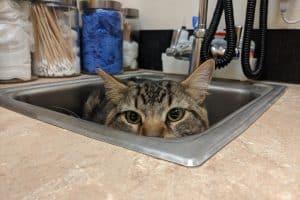Cats are beloved companions, known for their independent and sometimes mysterious nature. However, when it comes to their health, concerns can arise. One common condition that can affect our feline friends is pancreatitis.
Pancreatitis in cats can be triggered by a variety of factors, such as diet, obesity, infections, and certain medications.
Symptoms of Pancreatitis in Cats
If you suspect your furry friend may have pancreatitis, keep an eye out for common symptoms such as vomiting, loss of appetite, abdominal pain, lethargy, and dehydration. Cats with pancreatitis may also exhibit fever, diarrhea, and weight loss. It’s essential to consult your veterinarian if you notice any of these signs to get a proper diagnosis and treatment plan in place.
Diagnosing Pancreatitis in Cats
When it comes to diagnosing pancreatitis in cats, your vet will likely perform a combination of blood tests, ultrasounds, and biopsies to confirm the condition. Blood tests can detect elevated levels of pancreatic enzymes, while ultrasounds can reveal enlargement or inflammation of the pancreas. In some cases, a biopsy may be necessary to get a definitive diagnosis. Early detection is key to managing pancreatitis effectively, so don’t hesitate to seek professional help if you suspect your cat is suffering from this condition.
For more information on pancreatitis in cats, check out this informative resource from the American Veterinary Medical Association: https://www.avma.org/resources-tools/pet-owners/petcare/pancreatitis-cats
Treatment Options for Pancreatitis in Cats
If your furry friend has been diagnosed with pancreatitis, your veterinarian may recommend a combination of treatments to help manage the condition. Typically, treatment for pancreatitis in cats focuses on relieving symptoms, reducing inflammation, and supporting overall pancreatic health.
One common treatment option is providing your cat with medications such as pain relievers, anti-nausea drugs, and antibiotics to address any underlying infections. Your vet may also recommend a special diet that is easily digestible and lower in fat to ease the burden on the pancreas.
In severe cases, your cat may require hospitalization for more intensive treatment, including intravenous fluids to prevent dehydration and address any nutritional deficiencies. Your vet may also recommend additional testing, such as blood work and imaging scans, to monitor your cat’s progress and adjust their treatment plan as needed.
It’s essential to follow your vet’s recommendations closely and monitor your cat’s response to treatment. While pancreatitis can be a challenging condition to manage, with proper care and attention, many cats can experience relief from symptoms and improve their quality of life.
Preventing Pancreatitis in Cats
Preventing pancreatitis in cats starts with maintaining a healthy lifestyle for your furry companion. One key factor in preventing pancreatitis is maintaining a balanced diet that is low in fat and high in quality protein. Avoid feeding your cat excessive amounts of fatty foods or table scraps, as these can increase the risk of developing pancreatitis.
Additionally, promoting a healthy weight through regular exercise and portion control can help reduce the risk of pancreatitis. Obesity is a significant risk factor for developing pancreatitis in cats, so keeping your cat at a healthy weight is essential for their overall well-being.
Another crucial aspect of preventing pancreatitis is ensuring that your cat stays hydrated by providing fresh, clean water at all times. Dehydration can put additional strain on the pancreas, so encouraging your cat to drink an adequate amount of water is essential for their digestive health.
By following these preventative measures and working closely with your veterinarian to monitor your cat’s health, you can help reduce the likelihood of pancreatitis and keep your feline friend happy and healthy for years to come.
Key Insight: Regular veterinary check-ups are crucial in identifying any risk factors or early signs of pancreatitis in cats. By staying proactive with your cat’s healthcare, you can catch potential issues early and take steps to prevent pancreatitis before it becomes a serious concern.
For more information on feline pancreatitis, check out this helpful resource from the American Association of Feline Practitioners: Feline Pancreatitis Resource.
Understanding the Long-Term Effects of Pancreatitis in Cats
Pancreatitis in cats can have long-term effects on their health and well-being. Chronic pancreatitis can lead to issues such as diabetes mellitus, exocrine pancreatic insufficiency, and even pancreatic cancer. It is crucial to monitor your cat closely if they have a history of pancreatitis to catch any potential complications early on.
Additionally, pancreatitis can affect a cat’s ability to properly digest and absorb nutrients, leading to weight loss, malnutrition, and a weakened immune system. This can make them more susceptible to other illnesses and infections. Regular check-ups with your veterinarian and following a specialized diet can help manage these long-term effects and improve your cat’s quality of life.
Key Insight: Regular monitoring and specialized care can help manage the long-term effects of pancreatitis in cats and improve their overall health and well-being.
Pancreatitis vs. Other Digestive Conditions in Cats
When comparing pancreatitis to other common digestive conditions in cats, it’s important to understand that pancreatitis is a complex and serious illness that requires specific treatment. While issues like inflammatory bowel disease or gastroenteritis can also affect a cat’s digestive system, pancreatitis involves inflammation of the pancreas, a vital organ that plays a crucial role in digestion and regulating blood sugar levels.
Unlike some other digestive conditions that may resolve with dietary changes or medication, pancreatitis often requires more intensive treatment, including hospitalization, intravenous fluids, and strict dietary management. It is essential to work closely with your veterinarian to differentiate between these conditions and develop a tailored treatment plan for your cat’s specific needs.
Key Insight: Pancreatitis in cats requires specialized care and treatment compared to other digestive conditions, emphasizing the importance of accurate diagnosis and individualized care.
For more information on managing pancreatitis in cats, you can refer to the American Association of Feline Practitioners.
Interesting Facts About Pancreatitis in Cats
Cats can develop pancreatitis due to a variety of reasons, including high-fat diets, obesity, certain medications, and even infections. This inflammation of the pancreas can be quite severe and painful for our feline friends. One interesting fact is that pancreatitis in cats can often be challenging to detect early on, as they are masters at hiding discomfort. This means that by the time symptoms are noticeable, the condition may have already progressed significantly.
Another intriguing fact is that pancreatitis in cats can sometimes be triggered by other underlying health issues, such as inflammatory bowel disease or diabetes. This makes it essential for pet owners to work closely with their veterinarian to manage these conditions and minimize the risk of pancreatitis developing.
A unique insight worth noting is that certain breeds, such as Siamese cats, may have a higher predisposition to pancreatitis. This genetic component emphasizes the importance of understanding your cat’s specific health needs and potential risks based on their breed.
In addition to genetic factors, stress can also play a role in exacerbating pancreatitis in cats. Ensuring a calm and nurturing environment for your feline companion can help reduce the likelihood of stress-related flare-ups.
- Cats that have had previous gastrointestinal surgeries may be at a higher risk of developing pancreatitis.
- Feeding your cat a balanced and low-fat diet can help prevent the onset of pancreatitis.
- Regular check-ups and bloodwork can aid in the early detection and management of pancreatitis in cats.
- Keeping your cat hydrated is crucial in preventing pancreatitis episodes.
- Supervising your cat’s intake of human foods, especially fatty or greasy treats, can significantly reduce the risk of pancreatitis.
Remember, being proactive about your cat’s health and well-being is key to preventing and managing pancreatitis effectively. Talk to your vet about any concerns you may have, and together, you can provide the best care for your furry friend.
Alex, a passionate animal lover, has experience in training and understanding animal behavior. As a proud pet parent to two dogs and three cats, he founded AnimalReport.net to share insights from animal experts and expand his knowledge of the animal kingdom.









